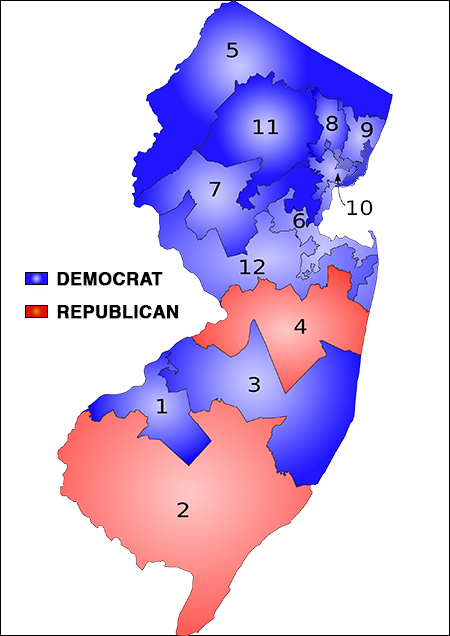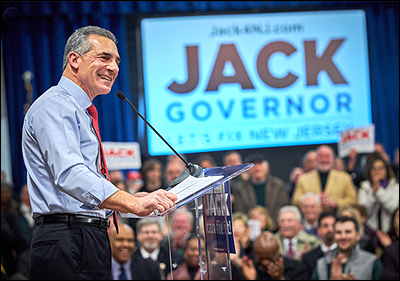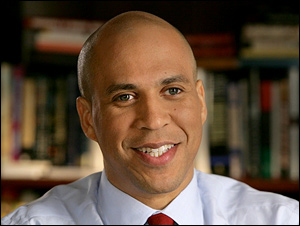By Jim Ellis
April 27, 2020 — The Monmouth University Polling Institute conducted a statewide poll of the New Jersey electorate (April 16-19; 704 New Jersey adults, 635 registered New Jersey voters, 96 percent of whom said they are certain or likely to vote in November) and while the results returned predictable figures in the presidential and Senate races, an interesting tidbit about the House races came to light.
In the presidential race, former vice president Joe Biden led President Trump 54-38 percent according to Monmouth’s latest New Jersey poll, and Sen. Cory Booker (D) led his strongest potential Republican opponent, 55-32 percent. Both sets of numbers were predictable and consistent with recent Garden State voting history.

New Jersey congressional districts: Districts 1, 6, 8, 9, 10, and 12 are the six safe seats. Districts 2, 3, 4, 5, 7, and 11 comprise the competitive sector.
Though the Monmouth pollsters didn’t test the individual House races, they did ask the partisan preference question and segmented the congressional districts into two campaign categories, the competitive group and the non-competitive group.
Statewide, 50 percent of the respondents said they would vote for the Democratic candidate for the US House of Representatives as compared to 38 percent who would choose the Republican contender. But when looking at the competitive House category, Republicans look to have a glimmer of hope of potentially recapturing some of the seats they lost in the 2018 election.
In that year, Democrats converted Districts 2, 3, 7, and 11, gaining four seats and leaving the 12-member NJ federal delegation with only one Republican member at the outset, Rep. Chris Smith (R-Hamilton) in the 4th CD. Since the election, Rep. Jeff Van Drew (R-Dennis Township/Atlantic City) changed parties after being elected as a Democrat. All of these seats, including District 4, and 5 in northern New Jersey (Rep. Josh Gottheimer-D), comprise the competitive sector. Districts 1, 6, 8, 9, 10, and 12 are the six safe seats.
In the “safe” House category, 56 percent of respondents said they would vote for the Democratic candidate as compared to 31 percent who aligned themselves with the eventual Republican general election candidate. In the competitive districts, however, by a 46-45 percent plurality, the respondents said they would vote for the Republican candidate. Considering that Rep. Gottheimer will not be seriously challenged, the GOP numbers in the truly contested districts should even be stronger. This type of result should continue to make many of the Garden State seats prime 2020 Republican national targets.
The safe seats, with all incumbents seeking re-election, are held by Reps. Donald Norcross (D-Camden City), Frank Pallone (D-Long Branch), Albio Sires (D-West New York), Bill Pascrell (D-Paterson), Donald Payne (D-Newark), and Bonnie Coleman Watson (D-Ewing Township).
The competitive seats feature party-switching Rep. Van Drew seeking his first re-election. He looks strong in the Republican primary – a first vote as a party’s new incumbent can be difficult – and will face either college professor Brigid Callahan Harrison or Amy Kennedy, wife of former US Rep. Patrick Kennedy (D-RI), in what should be a competitive general election. With a solid Republican primary victory, Rep. Van Drew will be favored in November.
The 3rd District may be the Democrats’ most vulnerable seat. Freshman Rep. Andy Kim (D-Bordentown) upset then-Rep. Tom MacArthur (R) in 2018, and now faces what should be a strong GOP opponent. Venture capitalist David Richter, who was originally running in the 2nd District until Rep. Van Drew became a Republican, is considered the favorite for the GOP primary, and he appears to be a strong challenger for Rep. Kim but will have less time to develop the campaign. Gov. Phil Murphy (D) has moved the state primary from June 2 to July 7.
NJ-3 looks to be the most likely of the New Jersey seats to flip. Until Kim won here two years ago, and except for a one-term lag, Republicans had held this southern New Jersey seat since 1979.
Rep. Chris Smith (R-Hamilton), who was first elected to the House in 1980, looks to face an easier re-election contest this year than he did two years ago. In an election when he was the Republicans’ lone survivor, Rep. Smith scored a 55-43 percent victory.
Freshman Rep. Tom Malinowski (D-Rocky Hill) will almost assuredly face state Senate Minority Leader and former statewide candidate Tom Kean Jr. Sen. Kean’s father, Tom Kean, served as New Jersey’s governor from 1982-1990. This race promises to be a premier contest in a district that a Republican has represented since 1981 until Malinowski won in the most recent vote.
In northern New Jersey’s 11th District, freshman Rep. Mikie Sherrill (D-Montclair/Morristown) who won another traditionally strong Republican seat that the party had held since consecutively since 1985, stands for her first re-election. Her challenger is consensus Republican candidate Rosemary Becchi, an attorney and former Capitol Hill committee staff member, who was originally challenging Tom Kean Jr. for the party nod in the 7th District.
Party leaders were able to convince her to run in the 11th CD and helped clear the field. She will be a credible challenger to Rep. Sherrill, but the congresswoman is such a strong fundraiser (already has raised $3.4 million for this election) that the race will be a difficult one for Sherrill despite what should be a favorable district.
With Republicans developing a strong slate of New Jersey US House candidates in places where they have traditionally been successful, the Garden State elections will go a long way toward determining if the GOP has any chance of re-claiming the House majority. If the Democrats stem the tide here, they very likely will retain control.







